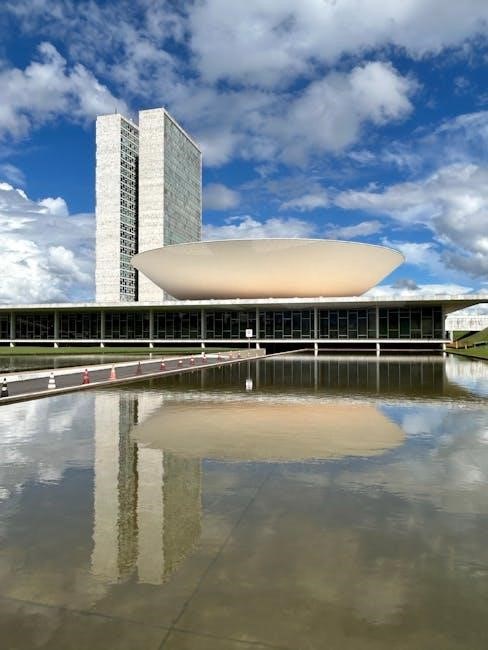Written by Junot Díaz, The Brief Wondrous Life of Oscar Wao is a groundbreaking novel that blends slang, Spanglish, sci-fi references, and Caribbean culture․ The story revolves around Oscar, a young Dominican-American man growing up in New Jersey, who is obsessed with fantasy novels and struggles with his identity․ The novel explores themes of identity, culture, family, and the immigrant experience, weaving together elements of myth, history, and personal narrative․ Díaz’s vivid prose and innovative storytelling style make the book a compelling read․ The novel won the Pulitzer Prize for Fiction in 2008, cementing its place as a modern literary classic․ It is a tragic yet vibrant tale of love, loss, and the search for belonging in a fragmented world․

1․1 Background of the Novel

The Brief Wondrous Life of Oscar Wao, written by Junot Díaz, was first published in 2007 and quickly gained critical acclaim for its innovative storytelling and rich cultural depth․ The novel is set against the backdrop of the Dominican diaspora, exploring the experiences of Dominican immigrants in the United States and their struggles with identity, culture, and family history․ Díaz, who was born in the Dominican Republic and raised in New Jersey, drew heavily from his own experiences as an immigrant to craft the narrative․

The novel is deeply rooted in Dominican culture, blending elements of Caribbean folklore, slang, and historical references․ Díaz’s use of Spanglish and dialect reflects the hybrid identity of his characters, who are caught between their Dominican heritage and their American upbringing․ This linguistic blend adds a layer of authenticity to the story, making it resonate deeply with readers familiar with the immigrant experience․
One of the most striking aspects of the novel is its non-linear narrative structure․ The story is told through multiple voices, including Oscar, his sister Lola, and his friend Yunior, each offering a unique perspective on the events․ This multi-narrative approach allows Díaz to explore themes of identity, family secrets, and the intergenerational curse, or fukú, that haunts the characters․

The novel also delves into the political history of the Dominican Republic, particularly the brutal dictatorship of Rafael Trujillo, which lasted from 1930 to 1961․ Díaz weaves historical facts into the narrative, providing context for the characters’ struggles and the collective trauma that shapes their lives․ This blending of personal and historical narratives creates a rich tapestry that highlights the resilience and complexity of the Dominican people․
Díaz’s writing style is both poetic and raw, combining elements of myth, science fiction, and street slang․ His use of vivid imagery and humor brings the characters to life, making their struggles and triumphs feel deeply personal․ The novel’s title itself reflects the duality of Oscar’s life—his brief existence is filled with both wonder and sorrow, capturing the essence of the immigrant experience․

The Brief Wondrous Life of Oscar Wao has been praised for its originality and its ability to bridge cultural divides․ It has won numerous awards, including the Pulitzer Prize for Fiction in 2008, and has been widely recognized as a landmark work in contemporary literature․ The novel’s success lies in its ability to resonate with readers from diverse backgrounds, offering a universal story of identity, belonging, and the enduring power of family․
1․2 Plot Overview
The Brief Wondrous Life of Oscar Wao is a sweeping narrative that follows the life of Oscar de León, a young Dominican-American man growing up in New Jersey․ Oscar is an overweight, socially awkward, and deeply introverted individual who is obsessed with science fiction, fantasy novels, and comic books․ His dream is to become the Dominican J․R․R․ Tolkien, but his struggles with identity, culture, and family history make his journey fraught with challenges․

The story begins with Oscar’s childhood in Paterson, New Jersey, where he is raised by his mother, Beli, and his grandmother, La Inca, after his father abandons the family․ Oscar’s life is marked by isolation and loneliness, as he struggles to fit in with his peers and navigate his dual identity as both Dominican and American․ His obsession with fantasy and science fiction serves as an escape from the harsh realities of his life, but it also alienates him further from those around him․
Oscar’s story is intertwined with that of his family, particularly his sister, Lola, and his friend, Yunior, who narrates much of the novel․ Through these multiple perspectives, the reader gains insight into the broader family history, including the experiences of Oscar’s mother, Beli, and his grandfather, Abelard, in the Dominican Republic․ The novel delves into the dark history of the Dominican Republic under the dictatorship of Rafael Trujillo, whose regime had a devastating impact on the de León family․

Central to the plot is the concept of the fukú, a curse that is believed to have been placed on the family after Abelard’s involvement in politics․ The fukú is blamed for the series of tragic events that befall the de León family, including poverty, illness, and personal loss․ Oscar’s life is deeply affected by this curse, as he struggles to find love and acceptance in a world that seems determined to reject him․

Despite his challenges, Oscar remains a deeply romantic and hopeful individual․ His quest for love leads him to a series of failed relationships, but he never loses faith in the possibility of finding true love․ His journey takes him to the Dominican Republic, where he reconnects with his roots and finds a sense of belonging that he had been lacking in the United States․
The novel’s climax is both tragic and poignant, as Oscar’s life comes to an end in a way that is both unexpected and deeply symbolic․ His death serves as a reminder of the enduring power of the fukú and the cyclical nature of the family’s struggles․ However, it also underscores the resilience and strength of the de León family, who manage to survive even in the face of overwhelming adversity․
Through Oscar’s story, Díaz explores themes of identity, culture, family, and redemption․ The novel is a powerful exploration of the immigrant experience, offering a nuanced portrayal of the challenges and triumphs of those who are caught between two worlds․ Oscar’s life may be brief and wondrous, but it is also deeply human, and his story resonates long after the final page is turned․



